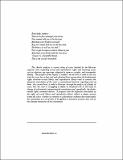| dc.description.abstract |
This Article analyzes a recent string of cases decided by the Mexican supreme court regarding sexual and reproductive rights and involving issues such as abortion, gay marriage, adoption by same-sex couples, and transgender identity. The purpose of this inquiry is twofold. At one level, it seeks to sort out what the court has in fact said and refrained from saying about the fundamental rights involved—sexual liberty and reproductive liberty—and to contrast the disparate articulation of the court’s constitutional doctrine regarding each of them. At a second level, it seeks to illustrate, through the analysis of a family of cases, how the court is struggling to define its newfound role as the entity in charge of substantively interpreting the constitution and, specifically, the fundamental rights contained therein. It proposes that the disparate articulation of the rights of sexual liberty and reproductive liberty reflects a deeper tension within the court: whether to continue in a formalistic tradition that understands the constitution as a set of rules to be applied or instead to assume a new role as the ultimate interpreter of the constitution. |

